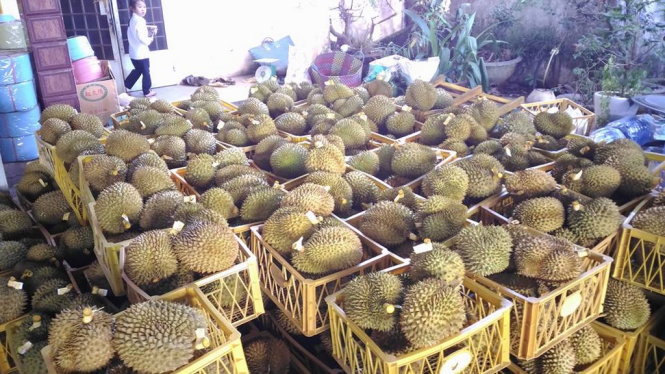Debate has raged in Vietnam over the use of legal chemicals to artificially ripen fruits, after a facility in the Central Highlands province of Lam Dong was caught ripening numerous immature durians this way last week.
On September 1, an inspection team raided a fruit facility in Di Linh District as employees were busy dousing some 700kg worth of green durians into a barrel containing a yellow liquid.
The facility owner confessed to officials that the liquid was a mixture of 40 liters of raw water, 500ml of a foliar fertilizer labeled HPC-97HXN and a little turmeric powder.
The immature fruits would subsequently become ripe two to three days after being soaked in the mix.
Inspectors seized 2.05 metric tons of chemical-doused durians at the facility, plus 13 bottles of fungicide and four bottles of HPC-97HXN.
There were also multiple containers of other chemicals and 89kg of packaging and labels in Chinese characters.

The facility opened in July and had frequently sourced unripe durians before artificially ripening them with the chemicals and offering them for sale.
The facility manager, only known as Truong, said they worked for a fruit company called Rong Hoa Thai, located in the southern province of Tien Giang.
After being doused with the chemical mix, the artificially ripened durians would be put into cardboard boxes, labeled with Chinese characters and loaded onto trucks for delivery.
Truong did not say where the fruits would be sold.
Can fertilizer be used to enhance ripeness?
The raid on the Lam Dong facility has given rise to concern among local consumers, who now have to think twice before buying durians.
The case has also ignited debate over the safety of the HPC-97HXN chemical, the main ingredient of the ‘magic liquid’ used to ripen the fruits.
HPC-97HXN is in fact ethephon, a plant growth regulator widely used on wheat, coffee, tobacco, cotton, and rice in order to help the plants' fruits reach ripeness at the right time. Upon being metabolized by the plants, it is converted into ethylene, a potent regulator of plant growth and ripeness.

In Vietnam, HPC-97HXN, commonly known as foliar fertilizer, is listed among chemicals allowed by the Ministry of Agriculture and Rural Development.
It has been said that the facility in Lam Dong did nothing wrong in using a legal chemical in expediting the ripeness of their durians.
Media reports of the inspection in Lam Dong have also been blasted for creating false concern among consumers, potentially causing durian farmers to go bankrupt as people turn their back on the delicious tropical fruit.
On Saturday, the Lam Dong Plant Protection Department officially addressed the issue, saying that it was inappropriate to use HPC-97HXN to boost durians' ripeness.
“HPC-97HXN is allowed to be used as a fertilizer, and is listed among banned chemicals for agricultural produce preservation,” department head Lai The Hung said.
Hung added HPC-97HXN contains many allowed regulators for plant ripeness, but at the same time, “there are many kinds of heavy metals and other substances that are only good for the plants, rather than their fruits.”
“These substances are very toxic once absorbed by the harvested fruits and later, in the body of the consumers,” he said.
“Consequently, it is wrong to douse harvested fruits into any mixture that contains HPC-97HXN.”
 The barrel used to douse the durians with chemicals
The barrel used to douse the durians with chemicals
Hang Van Chuc, head of the economic bureau of Di Linh District, said tests on the seized durians showed that the fruits contained many heavy metal residues.
The durians would therefore be destroyed, he added.
Nguyen Xuan Hong, former head of the Plant Protection Department under the agriculture ministry, said there is no allowable ripeness regulator in Vietnam.
“Using foliar fertilizer to boost a fruit’s ripeness is making wrong use of the product,” he said.
Hong said HPC-97HXN has ethephon in its content but that does not necessarily mean the product can be used as a ripeness agent.
“The foliar fertilizer contains many substances whose effects on human health have yet to be identified,” he added.
Like us on Facebook or follow us on Twitter to get the latest news about Vietnam!





















































